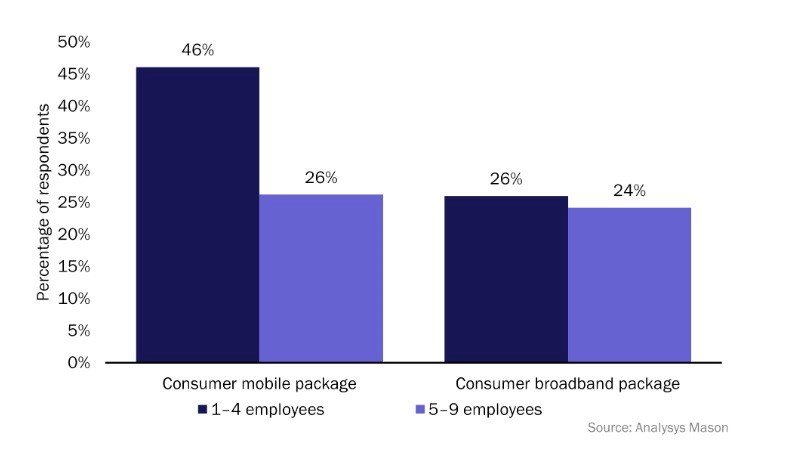
- All but ignored small office/home office (SoHo) sector now regarded as a potential goldmine for communications service providers
- But SoHo companies may be suspicious of the sudden attention
- Selling services to SoHo outfits will not be easy, and trust hard to build, notes the team at Analysys Mason
- But strategies and tactics to exploit the enormous SoHo sector are being honed
As communications service providers (CSPs) cast about for new ways to increase their revenues and profitability, they should turn to using well-baited nets in which to catch the huge number of small office/home office (SoHo) businesses that, whilst being comparative minnows as individual enterprises, en masse make up the huge and hungry shoal of the underserved small business sector that has traditionally been largely ignored by the telcos.
That’s the key takeaway from new research undertaken by London, UK-headquartered research and consulting house Analysys Mason. It points out that while many SoHo businesses subscribe to consumer-grade communications and IT services of a generally acceptable but limited standard, they would benefit from upgrades to appropriate business-class service packages. The need is evident but currently unfulfilled, and CSPs too would enjoy an upside by being able to generate additional revenues and have the chance to upsell value-added services.
That said, and as the Analysys Mason team notes in an overview of its findings written by enterprise services lead analyst Catherine Hammond, selling business services to SoHos is by no means a straightforward proposition.
After generations of giving the SoHo sector the cold shoulder, CSPs will have their work cut out to convince small enterprises that they are now genuinely interested in hugging them in their warm and concerned embrace and eager to provide them with reasonably-priced, state-of-the-art, business-grade services. It’s a matter of the education of the SoHo sector and the demonstration of sincerity on the part of the service providers, but trust will be hard to build after all the years of neglect.
To be fair, some CSPs are even now trying to build bridges to the SoHo sector, and their strategies, tactics and successes (or lack of them) will be instructive to the other CSPs and digital service providers (DSPs) that will come along hoping to clean-up after the pioneers have taken the risks.
In essence, the report is a checklist of the tactics telcos might apply to convince SoHos that they will be valued as customers. As it says, "The SoHo market remains relatively underserved and there are substantial opportunities for operators that have an appetite to meet the demand from this segment.”
Quite – and they will need to demonstrate they are not going to bilk them by pressure-selling expensive technologies and services that are not a match for a SoHo’s needs.
Very small enterprises account for than half of all the business in the world
Very small enterprises – those with up to four employees – represent more than half of all the businesses in the world, and numbers are growing at an average compound annual growth rate (CAGR) of 2%. Analysys Mason’s market surveys show that in high-income markets, almost half of such businesses rely on consumer-grade mobile packages, and about 26% rely on consumer-grade broadband packages, as the chart below shows. This share tends to be even higher in middle-income markets, indicating a significant opportunity to upsell higher-value business services. To get their messages over to this market, service providers should develop marketing collateral that is more targeted to the needs of SoHos and offer consumer-style benefits with small-business products.

Percentage of very small businesses taking consumer packages, by business size, Germany, Singapore, UK and USA, 2021. Source: Analysys Mason
Currently, many SoHos believe that business solutions are too expensive for their needs and offer little in terms of added benefits compared to consumer solutions. Operators have employed various tactics to address what they like to call this “misconception”, and a few are reporting some success in upselling higher-value business propositions to SoHos as a result, according to the report’s authors, though it's a long-term proposition.
The report notes that one important tactic to attract SoHo business would be for CSPs to offer enhanced service and support with their business propositions, including dedicated business helplines and faster turnaround times for repairs or installation services than would apply to an equivalent consumer proposition. A step further would be for telcos to offer individual IT support, either bundled with the core proposition or offered as a value-added service. Either way, the cost of such offers would have to be scaled to what small businesses can afford, not what operators think they might or should be able to afford.
Service providers should also offer benefits that are of clear and evident practical use to SoHos, such as preferential deals and discounts on relevant third-party services such as accounting software or web marketing services. It might also include access to benefits that are more commonly associated with consumer services, such as music or video streaming. After all, purchase decisions for SoHos are often influenced not only by the benefits to their business but also by the benefits to their personal lives as well.
As for the aforementioned need for operators to convince SoHos that they are valued as customers, a good way to do so would be to spend some money on resources to provide tailored sales channels. Currently, operators serve SoHos via their existing sales channels for either consumers or for the small to medium-sized (SME) sector, which is a very different proposition to serving very small businesses.
Operators should also provide a degree of personal service. SoHo customers are typically low value, and most operators deal with them primarily through low-cost digital channels. However, small businesses often choose suppliers that are local or with whom they enjoy a strong relationship – and relationships can be built.
Other operator investments should focus on helping SoHos to improve their digital skills. Most very small companies have limited IT skills and operators have an opportunity to position themselves as valued partners by providing advice, support and training. Some CSPs have recognised the relationship-building opportunities in this regard, with Vodafone’s V-Hub initiative just one example.
It seems that CSPs are at last beginning to perceive the huge and global SoHo market as a real opportunity that can deliver much-needed new revenue streams. Competition in the SME market has increased during the past couple of years, with many operators now selling cloud-based value-added services that were previously targeted at larger enterprise customers.
The SoHo sector is in need of attention and appropriate, rather than perfunctory, services. Individual returns from SoHo customers may be very small compared to both the SME and corporate company sectors but, collectively the billions of them could, and should, generate billions in revenues and profits. It's up to the CSPs to ensure that happens.
Email Newsletters
Sign up to receive TelecomTV's top news and videos, plus exclusive subscriber-only content direct to your inbox.




